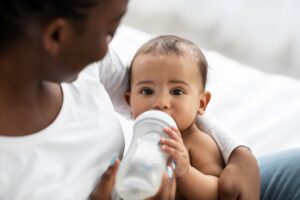
If you’re the parent or guardian of an infant or toddler, there’s a good chance your sleep schedule gets frequently interrupted. Babies and small children are notorious for waking up at all hours of the night for different reasons. You can often calm them with a bottle of milk or juice in bed to help them settle down so you can get some rest. However, doing so regularly could result in a condition known as baby bottle tooth decay.
If you’re not familiar with this issue, keep reading to learn more about it and how to prevent potential problems!
What is Baby Bottle Tooth Decay?
This term refers to the dental damage caused by long-term exposure to sugary fluids in bottles that most frequently impact the upper front teeth. The more they come into contact with sweet liquids, the more potential there is for them to develop decay. It can be caused by milk, formula, fruit juice, sodas, and other sweetened drinks that are regularly consumed. In fact, the American Academy of Pediatrics states that it can happen whenever their teeth are coated in almost any liquid besides water.
Unfortunately, tooth decay can also be passed from the primary caregiver through saliva that contains cavities. For example, if you’re feeding your child and lick the silverware at any point, you could potentially share harmful germs that lead to oral issues.
What Are the Symptoms of Baby Bottle Tooth Decay?
Unfortunately, it can be hard to know if your child is suffering from early tooth decay because their teeth are small so it’s harder to spot any areas of concern. That’s why it’s so important that you schedule routine checkups every 6 months. Your pediatric dentist knows what to look for and can identify issues in time to treat them. If you notice white spots on their teeth or they seem to be in any discomfort, you should make an appointment.
How Can I Prevent Baby Bottle Tooth Decay?
A few helpful tips for preventing this from occurring include:
- Ensure that guardians and children don’t share dirty silverware.
- If your infant hasn’t grown any teeth yet, wipe their gums down with a clean, damp washcloth after feedings.
- When their first pearly whites arrive, brush them gently with a small, soft-bristled brush without toothpaste because they’ll likely ingest it.
- By the time they turn 3, it’s usually safe to use a small amount of fluoride toothpaste, about the size of a grain of rice.
- Finish bottles before naps and bedtime.
- Only use bottles for formula, milk, breastmilk, or water.
- If your little one uses a pacifier, don’t coat it in sugar or honey, and clean it before putting it in their mouth.
Taking a few simple precautions goes a long way toward keeping your child’s teeth and gums safe and healthy!
About the Practice
At Glen Ellyn Pediatric Dentistry, your family benefits from a team of highly skilled dentists who provide a full range of services for still-developing smiles. They know every child is unique and take the time to get to know your dental concerns and goals for them so they can provide fully individualized solutions. They are experienced in treating kids of all ages with a range of needs and abilities so no matter the state of their grin, they can protect and preserve it. If you’re worried that your infant or toddler has baby bottle tooth decay, you’re welcome to request an appointment on the website or by calling (630) 858-8755.
